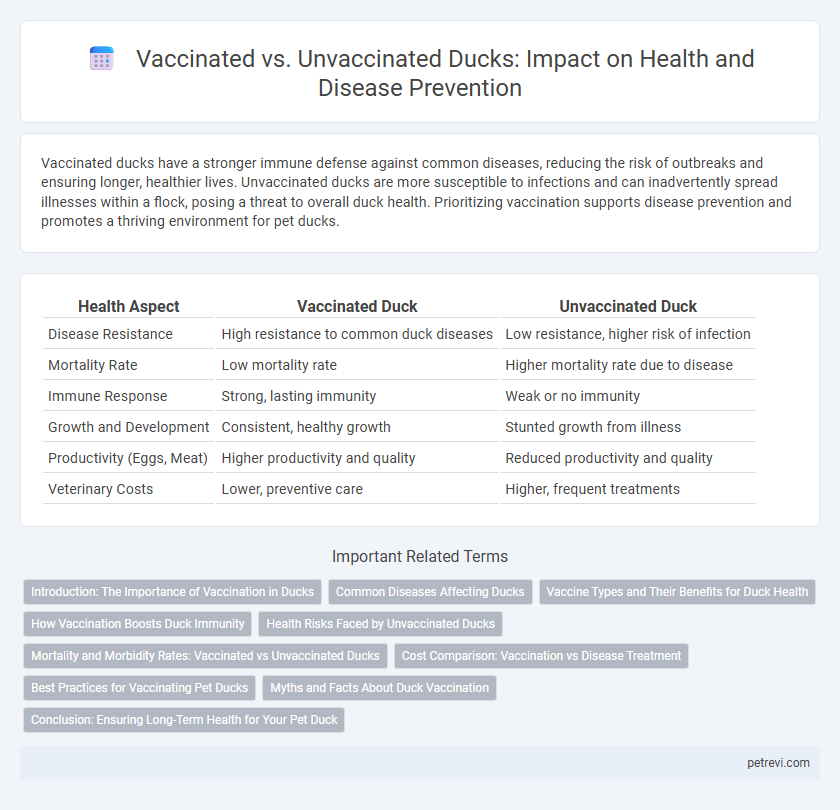Vaccinated ducks have a stronger immune defense against common diseases, reducing the risk of outbreaks and ensuring longer, healthier lives. Unvaccinated ducks are more susceptible to infections and can inadvertently spread illnesses within a flock, posing a threat to overall duck health. Prioritizing vaccination supports disease prevention and promotes a thriving environment for pet ducks.
Table of Comparison
| Health Aspect | Vaccinated Duck | Unvaccinated Duck |
|---|---|---|
| Disease Resistance | High resistance to common duck diseases | Low resistance, higher risk of infection |
| Mortality Rate | Low mortality rate | Higher mortality rate due to disease |
| Immune Response | Strong, lasting immunity | Weak or no immunity |
| Growth and Development | Consistent, healthy growth | Stunted growth from illness |
| Productivity (Eggs, Meat) | Higher productivity and quality | Reduced productivity and quality |
| Veterinary Costs | Lower, preventive care | Higher, frequent treatments |
Introduction: The Importance of Vaccination in Ducks
Vaccination significantly reduces the risk of infectious diseases such as avian influenza and duck viral enteritis, which can cause severe mortality in duck populations. Unvaccinated ducks are more susceptible to outbreaks that compromise flock health and productivity, leading to economic losses for farmers. Implementing vaccination protocols enhances immune response, promoting overall health and longevity in both domestic and wild ducks.
Common Diseases Affecting Ducks
Vaccinated ducks show significantly lower incidence rates of common diseases such as duck virus enteritis (DVE), avian influenza, and Pasteurella multocida infections, compared to unvaccinated populations. Vaccination enhances immunity against bacterial and viral pathogens, reducing mortality rates and improving overall flock health. Unvaccinated ducks remain highly susceptible to outbreaks that can cause rapid spread, severe symptoms, and substantial economic losses.
Vaccine Types and Their Benefits for Duck Health
Vaccines such as Duck Viral Hepatitis vaccine and Duck Enteritis vaccine provide critical immunity against highly contagious diseases, significantly reducing mortality rates in vaccinated ducks. Vaccinated ducks exhibit improved resistance to infections, enhanced growth performance, and fewer outbreaks, compared to unvaccinated populations that are highly susceptible to viral and bacterial pathogens. Utilizing inactivated, live attenuated, and recombinant vaccines ensures robust protection, promoting overall flock health and productivity in commercial and domestic settings.
How Vaccination Boosts Duck Immunity
Vaccination significantly enhances duck immunity by stimulating the production of specific antibodies that target prevalent diseases such as avian influenza and duck viral enteritis. Vaccinated ducks demonstrate lower mortality rates and faster recovery times compared to unvaccinated counterparts, resulting in improved overall flock health and productivity. Effective vaccination protocols reduce the spread of infectious agents, thereby maintaining robust immune defenses and minimizing economic losses in duck farming.
Health Risks Faced by Unvaccinated Ducks
Unvaccinated ducks face significant health risks including susceptibility to avian influenza, duck viral enteritis, and bacterial infections like salmonellosis, which can lead to high mortality rates. Without vaccination, these ducks are less protected against common infectious diseases, resulting in weakened immune responses and increased outbreaks within flocks. Vaccination reduces the prevalence of disease, enhances overall flock immunity, and minimizes economic losses caused by illness and decreased productivity.
Mortality and Morbidity Rates: Vaccinated vs Unvaccinated Ducks
Vaccinated ducks exhibit significantly lower mortality rates, often reduced by up to 70%, compared to unvaccinated counterparts susceptible to common avian diseases such as duck viral enteritis and avian influenza. Morbidity rates in vaccinated populations also decrease, with fewer instances of severe symptoms and secondary infections, promoting overall flock health and productivity. Effective vaccination programs enhance immune response, reducing disease transmission and improving survival outcomes in commercial and domestic duck populations.
Cost Comparison: Vaccination vs Disease Treatment
Vaccinating ducks significantly reduces overall expenses by preventing costly treatments required for diseases such as avian influenza and duck viral enteritis. The cost of vaccines per duck typically ranges from $0.50 to $2, while treatment costs for infected ducks can exceed $10 to $50 per individual due to medication, veterinary care, and productivity losses. Investing in vaccination programs leads to better financial efficiency and healthier flocks compared to managing disease outbreaks in unvaccinated populations.
Best Practices for Vaccinating Pet Ducks
Vaccinating pet ducks against common diseases like duck viral enteritis and avian influenza significantly enhances their immunity and reduces mortality rates. Best practices include administering vaccines at recommended ages, maintaining proper hygiene during vaccination, and consulting a veterinarian for schedule adherence and booster shots. Regular health monitoring post-vaccination ensures early detection of adverse reactions and optimal duck health management.
Myths and Facts About Duck Vaccination
Duck vaccination plays a critical role in preventing common diseases such as avian influenza and duck viral enteritis, dispelling the myth that unvaccinated ducks are naturally immune. Scientific studies confirm vaccinated ducks exhibit stronger immune responses and reduced mortality rates compared to their unvaccinated counterparts. Misconceptions that vaccinations cause harm are unfounded, as vaccines undergo rigorous testing to ensure safety and efficacy in promoting overall duck health.
Conclusion: Ensuring Long-Term Health for Your Pet Duck
Vaccinating pet ducks significantly reduces the risk of viral infections such as avian influenza and duck viral enteritis, promoting stronger immune defenses and overall longevity. Unvaccinated ducks face higher susceptibility to common diseases, leading to potential health complications and increased mortality rates. Prioritizing vaccination ensures long-term health and a better quality of life for pet ducks, making it an essential component of responsible duck care.
Vaccinated vs Unvaccinated for Duck health Infographic

 petrevi.com
petrevi.com